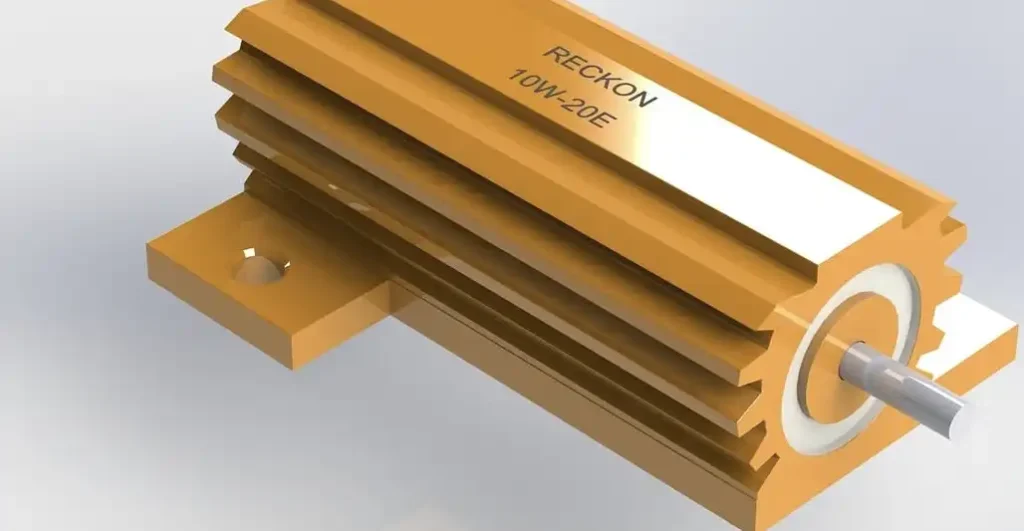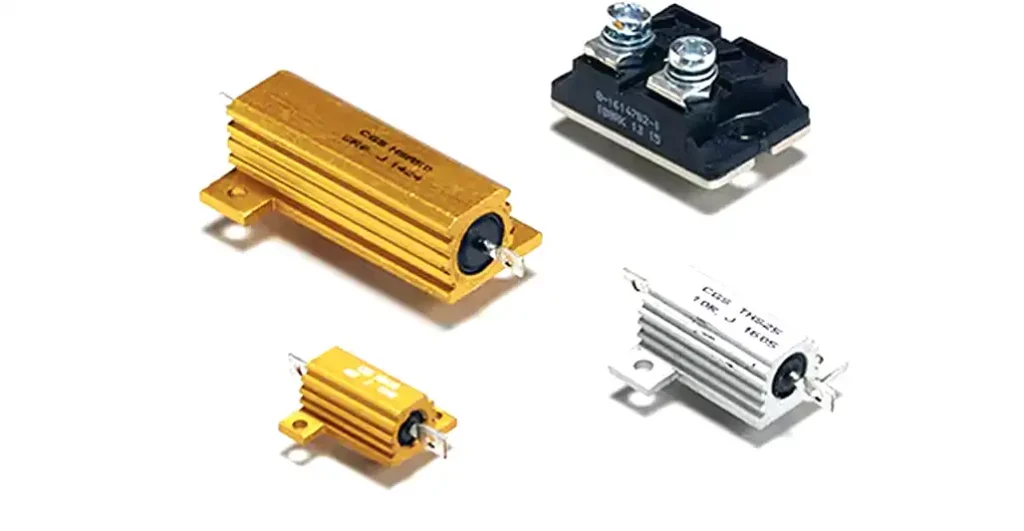In the realm of electronics, various components work cohesively to create the devices we depend on daily. One such critical component is the chassis mount resistor.
This blog post will delve into the details of what a chassis mount resistor is, its function, and its significance in electronic circuitry.
What is a Resistor?
A resistor is a passive two-terminal electrical component that implements electrical resistance as a circuit element. In electronic circuits, resistors serve to reduce current flow, adjust signal levels, divide voltages, and establish predetermined voltages or currents.
What Is Chassis Mount Resistor

A chassis mount resistor is a type of wirewound resistor that is housed in an extruded aluminum chassis mount housing. This specific design promotes heat loss and cooling, making it a suitable component for high-power applications where heat dissipation is crucial.
It is typically used in various industries including automotive, power supply units, and motor drives. The chassis or the device it is mounted on acts as a heat sink, absorbing the heat generated by the resistor and transferring it away from the component, thus ensuring efficient operation.
Key Characteristics of Chassis Mount Resistors
here are some key characteristics of chassis mount resistors:
High Power Rating: Chassis mount resistors are designed to handle high power dissipation, making them suitable for high power applications.
Effective Heat Dissipation: The design of these resistors allows them to dissipate heat effectively. The chassis or the device they are mounted on acts as a heat sink, absorbing and transferring the heat away from the resistor.
Robust and Durable: These resistors are known for their robustness and durability. They are built to withstand high temperatures, which is crucial in many industrial applications.
Versatility: Chassis mount resistors are used in a variety of applications, including power supplies, motor drives, and the automotive industry.
Different Types: These resistors come in different types such as wirewound, metal oxide, and thick film, each with its own set of advantages.
High Stability: Chassis mount resistors offer high stability and accuracy. They are less likely to change their resistance value, even under varying conditions.
Surge Protection: Certain types of chassis mount resistors, like metal oxide resistors, offer better surge protection, making them a reliable choice in circuits that are prone to voltage or current surges.
Size: Despite their power, many chassis mount resistors are compact in size, making them suitable for applications where space is a constraint.
Power Rating: A Crucial Aspect
One of the key aspects that set the chassis mount resistor apart from other resistors is its power rating. Power rating refers to the maximum amount of power a resistor can dissipate without exceeding its permissible temperature rise. Chassis mount resistors have a high power rating, making them suitable for applications that require high power dissipation.
Types of Chassis Mount Resistors

Chassis mount resistors come in several varieties, each with its unique properties and advantages. Here are the main types:
- Wirewound Resistors: These are among the most common types of chassis mount resistors. Wirewound resistors are known for their precision, stability, and ability to withstand high temperatures. They are constructed by winding a metal wire, usually nichrome, around a ceramic, plastic, or fiberglass core. The resistance value depends on the length, thickness, and type of the wire used. Wirewound resistors are often used in applications that require high power dissipation and precise resistance.
- Metal Oxide Resistors: Metal oxide resistors are made by mixing metal and metal oxide powders, which are then compressed into a desired shape before being heated. These resistors offer better surge protection, making them suitable for circuits that experience voltage or current surges. They also have a higher temperature coefficient than wirewound resistors, meaning their resistance changes more with temperature.
- Thick Film Resistors: These resistors are made by screen printing a resistive film onto a ceramic base. The film is then fired in a kiln to bond it to the base. Thick film resistors are commonly used in the electronics industry due to their small size, low cost, and versatility. They are suitable for a wide range of applications, from digital circuits to power electronics.
Each type of chassis mount resistor has its own set of advantages and is suitable for different applications. The choice of resistor depends on the specific requirements of the circuit, such as power rating, precision, temperature coefficient, and cost.
What Is a Chassis Mount Resistor Used for

A chassis mount resistor is typically used in applications that require high power dissipation and effective heat management. Thanks to their design, which promotes heat loss and cooling, they are ideal for situations where the resistor may heat up significantly.
Here are some common uses for chassis mount resistors:
- Power Supplies: These resistors are often used in power supplies to help regulate voltage and ensure stable power delivery.
- Motor Drives: In motor drives, they can be used to limit current, protect the circuit, and help control motor speed.
- Automotive Industry: Chassis mount resistors are used in various automotive applications, for instance, in the control systems of electric and hybrid vehicles.
- Industrial Equipment: They are also used in various types of industrial equipment for tasks such as load testing and dynamic braking.
- Audio Equipment: In audio equipment, these resistors can help reduce noise and improve sound quality.
- Heating Systems: These resistors can be used in heating systems where their ability to dissipate heat can be utilized.
The specific use of a chassis mount resistor largely depends on the needs of the particular circuit or device it is being used in.
Conclusion
In conclusion, the chassis mount resistor is an essential component in many high power applications. Its ability to dissipate heat effectively makes it a reliable choice for devices that generate a lot of heat. Whether it’s a power supply unit or a motor drive, the chassis mount resistor plays a vital role in ensuring these devices function efficiently.
Understanding the role and function of components like the chassis mount resistor not only gives us a deeper appreciation of the devices we use but also empowers us to troubleshoot and fix minor issues that may arise.